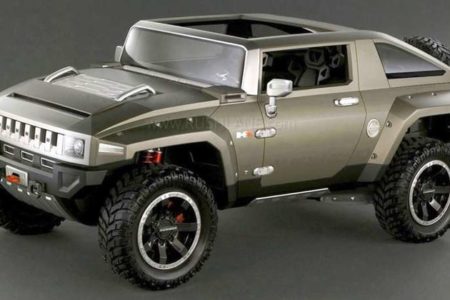February 26, 2020 – The blog post that follows is contributed by Jenna Tsui, her second on this site. Jenna is the editor and co-owner of The Byte Beat. In this contribution, Jenna looks at the rise of the electric truck in the 2020s. She begins by talking about the GMC Hummer, a vehicle that is associated by many with wasteful excess. So it is funny that General Motors should decide to turn this beast of a vehicle into one powered by electricity. The Hummer joins a number of new electric trucks and SUVs that are already in the market or soon to be. It is likely when we look back at the 2020s we will consider this year to be a turning point for electric vehicles (EVs) and the beginning of the electrification of light trucks, a very popular form of transportation in North America in particular.

When the Hummer first hit the market, it became something of a joke. The consumer version of the military Humvee was popular but it also earned a reputation for barely making it from one gas station to the next — the H1 only managed about 10 miles to the gallon.
While the brand didn’t survive the Great Recession, with the last model rolling off the assembly line in 2010, a recent announcement from GMC has hinted that the Hummer will be making a comeback in 2022 — but it won’t look like the gas guzzler of the past. Instead, this new Hummer will be one of a few electric trucks coming to the market in the next few years.
As demand for alternatives to traditional internal-combustion-engine (ICE) vehicles grows, the truck industry is experimenting with electric trucks. Here is what to expect — and whether or not these trucks will be able to provide a suitable alternative to ICE-powered ones.
The Year of the Electric Truck
Details are currently scarce about what we’ll be able to expect from the new electric Hummer, with GMC planning to provide more information in a few months, but right now what we do know is exciting. The electric powertrain will generate a whopping 1,000 horsepower and accelerate from 0-60 in three seconds or less. That and the fact that it will appear in 2022 sums it up.
The new Hummer isn’t the first or only electric truck to be announced in the last year. Tesla beat GMC to the punch with the debut of the company’s Cybertruck, which should be available sometime in 2021. The Cybertruck is also a fully electric truck with a 250-mile range that can accelerate from 0-60 in less than three seconds. The Cybertruck will start at $40,000, cheap compared to other trucks, but still fairly expensive.
Other companies are planning electric versions of existing models. Ford, for one, is developing a completely electric version of the F-150. Not a lot is known about this truck yet, but Ford has published a video of the electric F-150 pulling what the company claims to be one million pounds. And Fiat Chrysler has announced electric versions of its Jeep line of trucks, and the RAM pickup.
Rivian is an electric truck startup that recently received investments from General Motors. The company is developing an electric light truck, the R1T, and the R1S, an SUV.
All of these trucks are expected to deliver horsepower and torque comparable to most leading ICE trucks, and may just provide a more climate-change friendly alternative to the top-sellers on the market.
From Passenger to Freight
It isn’t just passenger trucks that are trading out their fossil-fuel-powered engines for an electric powertrain. Recently, Dot Transportation — one of the largest food redistribution companies in the country — deployed its first electric freight truck in Modesto, California. It works 12 hours a day, and could potentially save the company tens of thousands of dollars every year, all but eliminating the cost of fuel.
Tesla is also working toward developing and delivering fully-electric freight trucks which can allegedly reach 60 miles per hour in 20 seconds while hauling 80,000 pounds of freight, and with ranges from 300 to 500 miles, depending on battery pack size.
Whether companies choose a diesel or an electric freight hauler, they all need to be compliant with the U.S. Department of Transportation (DOT) and Federal Motor Carrier Safety Administration (FMCSA) regulations, something that can be challenging for small companies and new startups.
What About Hydrogen Fuel Cells?
Some companies, like startup truckmaker Nikola Motors, are also investigating other sustainable alternatives to combustion engine-based freight trucks — like tractor-trailers powered by energy-dense hydrogen fuel cells.
While hydrogen power has been around for years, the high price of hydrogen fuel cells has prevented their use in most consumer and freight vehicles. Now, however, after years of R&D investment, the hydrogen fuel cell has have become a more practical, emissions-free alternative to electric and ICE vehicles.
Nikola, which reportedly hopes to launch its hydrogen-powered eighteen-wheeler sometime next year, is also working to develop a light truck powered entirely by fuel cell. They do, however, face a steep challenge, the lack of a hydrogen cell refueling infrastructure across the country.
Undaunted Nikola plans to provide additional details about its hydrogen fuel cell trucks at its upcoming Nikola World 2020 in September.
Are Electric Trucks A Good Idea?
While electric vehicles (EV) that are cars do not rely on fossil fuels, some industry pundits argue that their manufacturing processes create just as much greenhouse gas (GHG) emissions as those that burn gasoline or diesel. They use the example of lithium mining’s excessive use of water, 1.9 million liters (500,000 gallons) to produce one ton of lithium. And nickel and cobalt, both used in the production of EV batteries, they point out, are toxic to the environment as well as those mining these minerals. Those defending the status quo argue that the GHGs produced in manufacturing an EV can be up to 68% worse than a comparable fossil fuel-powered vehicles.
Looking Forward
Whether you’re a fan of the Hummer brand or not, or of fossil-fuel powered trucks, the EV truck is arriving in showrooms around the globe. And if current market trends hold, it’s likely that EVs as a whole will become far more popular in the future. By 2022 we should know if the EV truck will be equally well received by a world seeking answers to the challenges of reducing carbon emissions from the transportation industry. As for those who think EVs are bad for the environment, there is the option of developing hydrogen fuel cell alternatives. And depending on how the hydrogen is sourced (not from natural gas but from water) this mode of transportation power could prove to be truly zero-emission.















